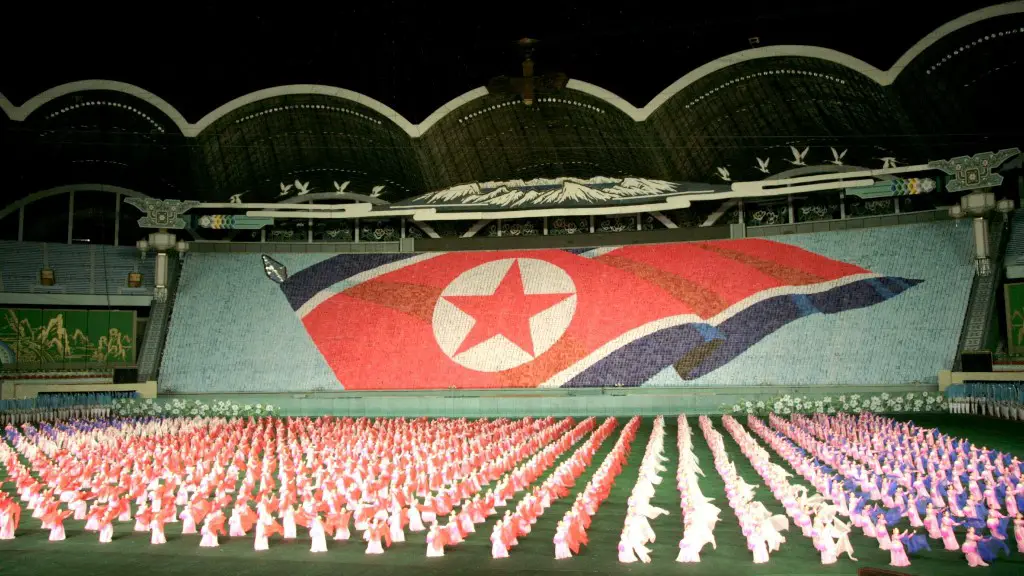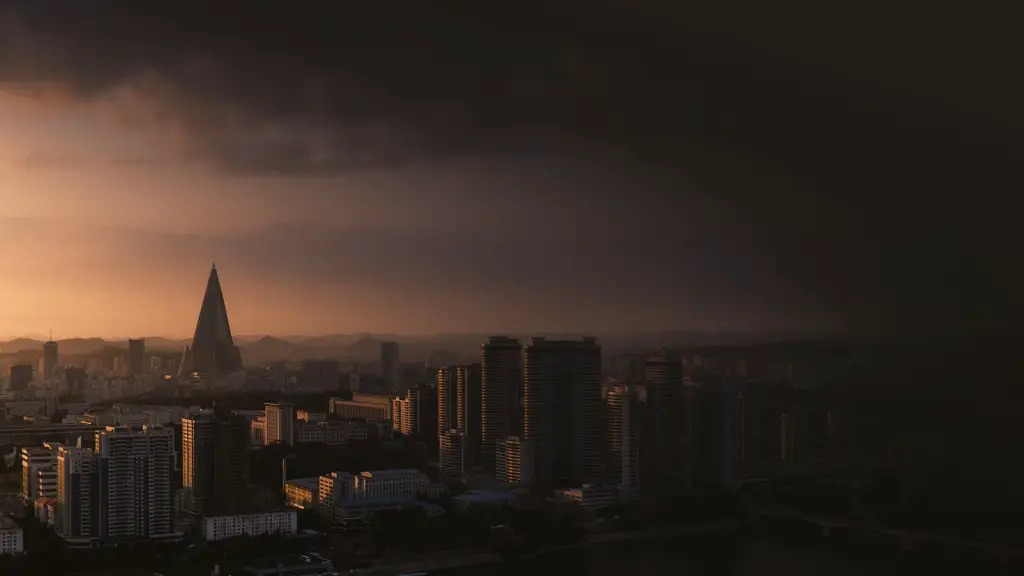Background
North Korea, officially the Democratic People’s Republic of Korea (DPRK), is a country in East Asia that covers the northern part of the Korean Peninsula. It shares a border with China to the north, and Russia to the northeast, and is separated from South Korea by the Korean Demilitarized Zone (DMZ). North Korea is the most highly militarized nation in the world, as Pyongyang devotes a huge portion of its economic output toward defense spending. It is a totalitarian state where the Kim dynasty has remained in power since its conception in 1948.
Historically, Korea was divided in two by two territories. In the north, the Democratic People’s Republic of Korea was established in 1948 and in the south, the Republic of Korea was formed the same year. As a result of the Cold War, North and South Korea became antagonistic nations and divided their lands, people, and governments. North Korea actively remained largely isolated from the rest of the world throughout the Cold War, and remained a nuclear state.
Formation of North Korea
The formation of North Korea dates back to 1945 when the Soviet Union declared war upon Japan and occupied Korea. The US and the Soviet Union met in Moscow and divided the country along the 38th parallel and it was agreed that liberal democratic reforms would be established in both territories. Pursuant to the agreement, elections were set to take place in both Russia and Korea in the same year.
The results in the election were that the Soviet Union formed the Democratic People’s Republic of Korea in the north under the leadership of Kim Il Sung and the United States formed the Republic of Korea in the south led by Syngman Rhee. The two leaders were sharp ideological rivals and consequently, these two states engaged in a bitter civil war, from 1950 to 1953.
North Korea as a Communist State
North Korea declared itself to be a socialist state, modeled after the currently implemented Marxist-Leninist-Stalinist system. It was led by a one-party government, the Korean Workers’ Party (KWP), and was along the same lines of the Soviet Union. North Korea declared that its foreign policy was to promote socialism and to oppose US imperialism. The US also increased its military presence in South Korea in order to protect it from the North Korean threat.
The government of North Korea implemented a series of harsh measures to control the population and its economy in the name of maintaining public order and control. This oppressive method of governance continued for the next two decades and only further intensified in light of the famine that hit the nation in the 1990s.
The Kim Dynasty & Relations with Other Countries
The Kim Dynasty, now headed by Kim Jong Un, has been the ruling family of North Korea since 1948. Kim Il Sung was the first leader of the nation and is widely viewed as the founder of the nation. His son, Kim Jong Il succeeded him and was the leader of North Korea until2011 when his son, Kim Jong Un, became the leader.
During Kim Jong Un’s rule, North Korea has adapted a more open diplomatic strategy and has held several rounds of talks with the US, China and other foreign leaders. North Korea has made some efforts to improve its relationship with other nations, such as by opening tourist sites and allowing foreign companies to operate in the country.
Trade & Economic Developments
Currently, North Korea faces economic challenges, as many of its industries remain inefficient, and due to international sanctions, it cannot trade with many countries. Despite this, the government has introduced several economic reforms in an attempt to boost its economic growth. This includes increasing its foreign trading activities, reducing bureaucracy, and taking a more open attitude towards foreign investment.
The government has also implemented several measures to protect its citizens’ rights and to improve the nation’s human rights record. This includes allowing limited freedom of expression and providing citizens with access to basic education and health care.
Politics in North Korea
As previously mentioned, North Korea is ruled by a totalitarian government, which suppresses dissent and bans any form of political opposition. It is estimated that more than 200,000 people have been sent to political prisons, where they are held for long periods of time and subjected to harsh treatment.
The government also does not permit any other political parties, and the media is strictly controlled and censored. The only information available to its citizens is from the state-run media, which provides news and propaganda that is often tailored to suit the government’s agenda.
Foreign Relations
North Korea’s foreign policy has historically been based on its strong opposition to US imperialism. It has also been historically hostile to its neighbor, South Korea and in recent years, has engaged in strained diplomatic ties with other countries. North Korea has called for reunification with South Korea, but South Korea has refused, citing North Korea’s oppressive government.
The US has been a major detractor of North Korea’s government, and has imposed a stringent trade embargo as well as a range of economic sanctions on the country. These sanctions are aimed at pushing North Korea towards giving up its nuclear weapons program and reducing its military spending. International pressure has been put on North Korea to abandon its nuclear program and to open up its economy to global markets.
Human Rights & International Criticism
The North Korean government has been widely criticized for its abysmal human rights record. It is estimated that there are thousands of political prisoners in the nation, who are subjected to extreme torture and deprivation. The government also operates a system of concentration camps, where political offenders are sent for life sentences and where tens of thousands of prisoners are reported to have succumb to starvation.
In addition, the government has been criticized for systematically denying its citizens basic rights and freedoms, such as freedom of expression, freedom of assembly and freedom of the press. All of these rights are highly restricted in North Korea, and violators can be punished harshly, often with imprisonment or even death.
International Aid
Despite its nuclear status, North Korea has sought aid from countries around the world to support its economy. International aid has been largely provided by China, South Korea, and Japan, as well as some European nations and the United States. However, most of this aid has been limited and conditional on North Korea giving up its nuclear program and implementing major reforms.
Nevertheless, the government has continued to be reliant on foreign aid to keep its people alive, as its agricultural system has struggled to produce enough food to feed the growing population and its industrial sector has been largely ineffective. In recent years, the United Nations has stepped in to provide food assistance to the North Korean populace.
Military Power
North Korea’s military is estimated to include as many as 1.2 million active personnel, making it one of the largest military forces in the world. It is estimated that the nation’s defense budget is approximately $7 billion, which is equivalent to almost 25% of the nation’s GDP.
The military’s main focus is on the defense of the nation, but there have been reports of it engaging in military activity in other countries. North Korea has been accused of supporting terrorist organizations and proxy forces in other countries and engaging in cyber warfare. In recent years, the US has increased its presence in the region in order to deter North Korea from further aggressive activity.
Nuclear Weapons Program
North Korea has capitulated the pursuit of becoming a nuclear state since the end of the Cold War and has continued those efforts since the mid-1990s. It is estimated that it currently has as many as 60 nuclear weapons and is capable of producing more at any given time. This has caused great consternation among many world powers, including its neighbor South Korea, who view the nuclear weapons program as a threat to their national security.
The international community has been outspoken in its condemnation of North Korea’s nuclear weapons program and has called for the commencement of negotiations between North Korea and other nations in order to curb the program. North Korea has also been threatened with further international sanctions if it continues to pursue its nuclear weapons program.
Power Struggle in North Korea
North Korea’s leaders often face internal power struggles within the nation. Leaders of the party have often been victims of assassination or imprisonment for dabbling in activities outside of official state policy. This has caused a sense of mistrust and instability within the country, as citizens are often reluctant to voice opinion and challenge the current ruling family.
In recent years, some of these power struggles have spilled out into diplomatic channels, as some of North Korea’s leaders have taken issue with certain policies of the US and other countries. While these disputes have mostly been resolved, there remains a certain level of mistrust between the two nations.
Religion in North Korea
Religious freedom is scarce in North Korea and the government has been accused of systematic oppression of religious activity. The government is notably hostile towards Christianity and many Christian pastors have been subject to imprisonment or execution.
Buddhism is the most widely practiced religion in North Korea, and the country boasts some of the oldest Buddhist temples in the world. However, these temples have been subjected to government control and are often monitored by government officials.
Citizens Rights
Citizens of North Korea have very few rights and freedoms and are subject to some of the strictest forms of censorship and control in the world. The government tightly controls the media, art and culture and suppresses any sign of dissent. Citizens are also not allowed to travel abroad or to access the internet with any degree of freedom.
The government also controls access to information, with most of the media limited to state-controlled outlets. This means that most citizens do not have access to any alternative views and opinions outside of those endorsed by the government.
Conclusion
In conclusion, North Korea remains a highly militarized and oppressive nation, which is ruled by a totalitarian government and constantly under threat from outside powers. Despite its economic troubles, it has managed to survive and maintain its independence. North Korea is an enigmatic nation and its future remains uncertain.



